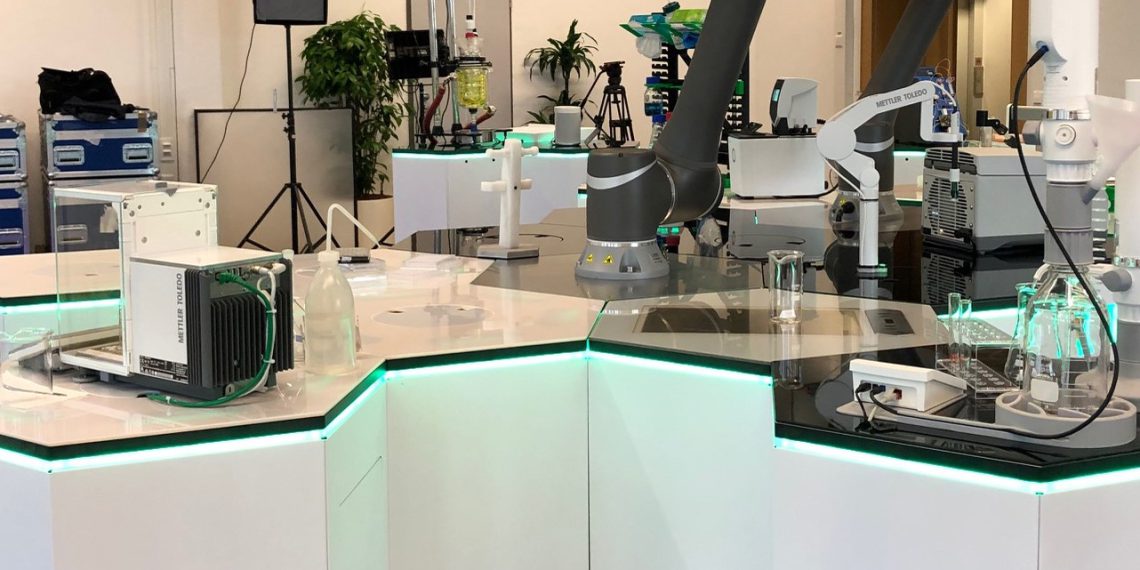Smart solutions for the digital transformation of the laboratory world will be the focus of analytica, the leading trade fair for analytics, laboratory technology and biotechnology, which will open its doors at the Messe München exhibition center from June 21 to 24, 2022. Electronic lab journals, automated high-throughput screening and pipetting robots: the digital transformation of the laboratory world has long since begun. “There is a clear desire in the laboratory sector for more digital support and automation,” knows Armin Wittmann, analytica project manager at Messe München. “analytica brings future technologies to life to accelerate the transition to Lab 4.0.”
Special show on digital transformation: experiencing the smart lab live
According to a study by the Fraunhofer Institute for Manufacturing Engineering and Automation IPA, which examined the degree of digitization in life science laboratories, it is primarily a lack of acceptance and willingness to change, as well as ignorance about the possibilities of new technologies, that are currently holding back laboratory digitization. The analytica special show Digital Transformation aims to break down such barriers by giving visitors a live demonstration of collaborative robots and other technologies.
The very setup of the analytica special show is a highlight. It is based on the iHEX honeycomb laboratory system designed by a team led by Dr. Felix Lenk, CEO of SmartLab Solutions GmbH and head of the SmartLab Systems research group at Dresden University of Technology. The innovative hexagonal modules are equipped with various functions, can be flexibly arranged and are linked electrically and via data connections to form an overall system according to the plug-and-play concept.
Helping robots
Collaborative robot arms are an essential component of the smart laboratory at the analytica special show. They assist laboratory personnel with simple tasks such as inserting caps into a centrifuge or sealing sample vials.
“The goal is to perform more experiments or analyses with higher quality using fewer resources in the future.”
- Felix Lenk
Participants include Mettler Toledo with measuring and precision instruments, Düperthal with safety cabinets and storage systems, and 2mag with stirring and heating technology and Integra Biosciences.
While walking through the exhibition halls, analytica visitors will probably also meet Kevin, a mobile laboratory robot developed by researchers from Fraunhofer IPA. Equipped with a robotic arm, camera, image processing and learning algorithm, Kevin can, for example, transport samples from one instrument to the next or fetch reagents from storage. “Kevin aims to relieve laboratory staff, not replace them,” emphasizes Matthias Freundel, head of the Digital Lab Services group at Fraunhofer IPA. “It’s about relieving highly skilled lab staff of simple tasks so they have more time for value-added activities.”
Uniform interfaces
Another challenge in Lab 4.0: All devices must communicate with each other and exchange data. In addition, they are connected to the users’ mobile devices, and in some cases also to external IT offices. This vision can only be implemented if all software and laboratory technology is network-compatible and all devices have a standardized interface.
The OPC UA (Open Platform Communications Unified Architecture) standard established in industrial automation is suitable as a basis for networking in the laboratory, as the industry association SPECTARIS will explain at the analytica Forum Digital Transformation. A SPECTARIS working group is currently developing the Laboratory Agnostic Device Standard, or LADS for short, which complements OPC UA and makes it fit for the laboratory environment. The Digital Transformation special show will demonstrate how standardized device communication with OPC UA LADS makes seamless order processing in routine laboratories possible.
Advanced laboratory reality
Many laboratory activities cannot be easily automated because they are too complex or require variable action. Digital support would nevertheless be helpful here. That’s why the Digital Transformation Forum at analytica 2022 is also focusing on technologies that have hardly found their way into the laboratory world to date, such as voice control of devices and virtual or augmented reality instruments. Augmented reality goggles, for example, could give laboratory staff instructions on work processes, automatically record the steps performed or display warnings if sample tubes are filled incorrectly.
Synergy effects for the Lab 4.0
Whether in research or routine laboratories, the digital transformation is opening up unimagined opportunities, but it is also presenting the laboratory industry with an enormous challenge that can only be mastered through close interaction between equipment manufacturers and software developers, researchers and laboratory operators. analytica, with its combination of trade fair, analytica conference and extensive supporting program, sees itself as a platform that brings all these players together. This year, Messe München is offering visitors to analytica special added value: their ticket gives them free access to automatica, the leading trade fair for intelligent automation and robotics in production, which is taking place at the same time.

















